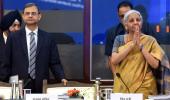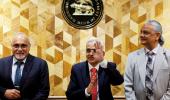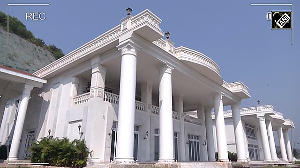'RBI supervision is much sharper today than what it was earlier.'

Outgoing Reserve Bank of India Governor Shaktikanta Das spoke of how the relationship between the central bank and the government has evolved, why putting business restrictions is the last resort for the regulator, and that growth is impacted by a multiplicity of factors, not just one factor of the repo rate.
When you moved to the Reserve Bank of India, there were concerns about the divide between North Block and Mint Street.
As you sign off, how do you see this relationship and what has been your experience about it?
The relationship is at its best.
We had excellent cooperation and coordination before, during, and after Covid, the multiple challenges which we faced when prices spiked following the start of the war in Ukraine.
The government took a lot of supply-side measures, which helped the RBI to check inflation. The same level of coordination continues.

Do you think the role of the central bank has strengthened now under the MPC (Monetary Policy Committee) framework and with a consultative approach to regulation?
Certainly -- the consultative approach to regulation, the flexible inflation-targeting framework, and the Bimal Jalan committee, which was jointly set up with the government (helped in this).
A selection of members was jointly done by the government, the finance ministry and the RBI. It was constituted immediately after I took over at the RBI.
I think many things have been institutionalised and as the economy grows, the economy is also getting formalised.

What would you like to say to your critics that growth has been sacrificed, monetary policy has remained too tight, and inflation still remains beyond the central bank's mandate?
I am constrained by the fact that we are still in the silent period after the monetary policy. So I cannot comment on that much.
But I would like to say a couple of things. People are entitled to their views outside and even within the RBI.
Within the MPC also, there are differing views, which is normal.
I think growth is impacted by a multiplicity of factors, not just one factor of the repo rate.
High growth or slowing growth is affected by multiple factors.
Our effort has been to follow and make the monetary policy as appropriate as possible, keeping in mind the prevailing conditions and, more importantly, the overall outlook.
Within the RBI, and within the MPC, we are convinced what we have done was the best option available.
You are possibly one of the few RBI governors to see a lot of bank failures in your tenure.
But if in 2024, if you were given a moment to tackle or look at things in a different way and come up with a different solution, would you like to touch upon any of it?
Our effort was always to see that public money is not burdened. So, we tried to deal with each situation.
You cannot have a standard template of dealing with such stress because problems in every case of bank stress or NBFC (non-banking financial company) stress vary.
I think today RBI supervision is much sharper than what it was earlier.
Our effort is always to identify a potential problem and to nip it in the bud.
In a monetary policy statement I had said "we do not wait for the house to catch fire".

In your tenure we have seen the RBI doing business restrictions. Do you think the mechanism of putting business restrictions has been institutionalised within the RBI?
Putting business restrictions is always the last resort. We try to avoid such a situation.
We engage with individual banks or NBFCs for months together.
In fact, in one or two cases it goes even beyond a year. There are a few institutions that have not come to light.
Through the process of direct interaction, we have been able to resolve the problems and the institutions concerned responded quickly.
We do not like to prolong those restrictions.
Recently, four microfinance lenders faced restrictions and we have withdrawn restrictions in one of them in less than two months.
It is because we saw immediate compliance and very quick steps were taken.
Even after putting restrictions, our focus is on directly continuing interaction with the institution, helping it out.

We have a new MPC with your departure. Do you think there needs to be continuity in the MPC framework?
The MPC is an institution. It will continue.
The new members have participated in two meetings and there is the Monetary Policy Department of the RBI, which does all the research and makes presentations.
So I don't think it should be an issue at all.
Feature Presentation: Ashish Narsale/Rediff.com












 © 2025
© 2025